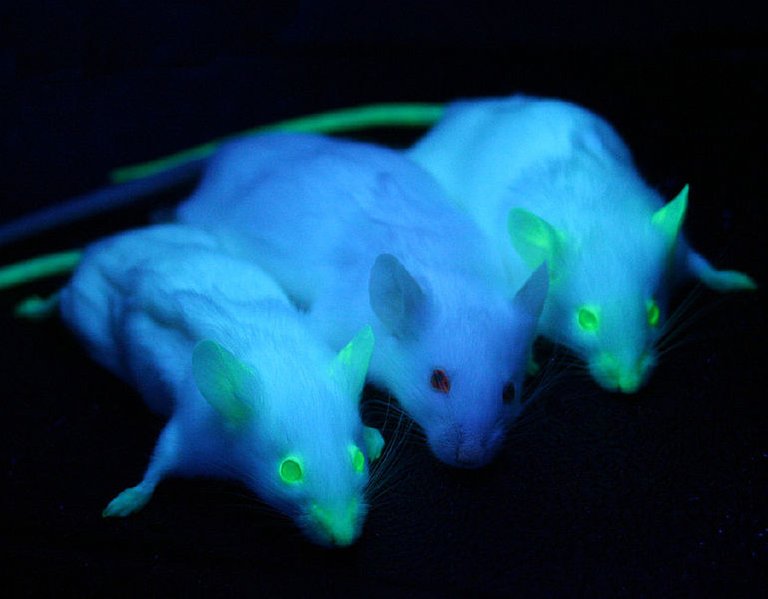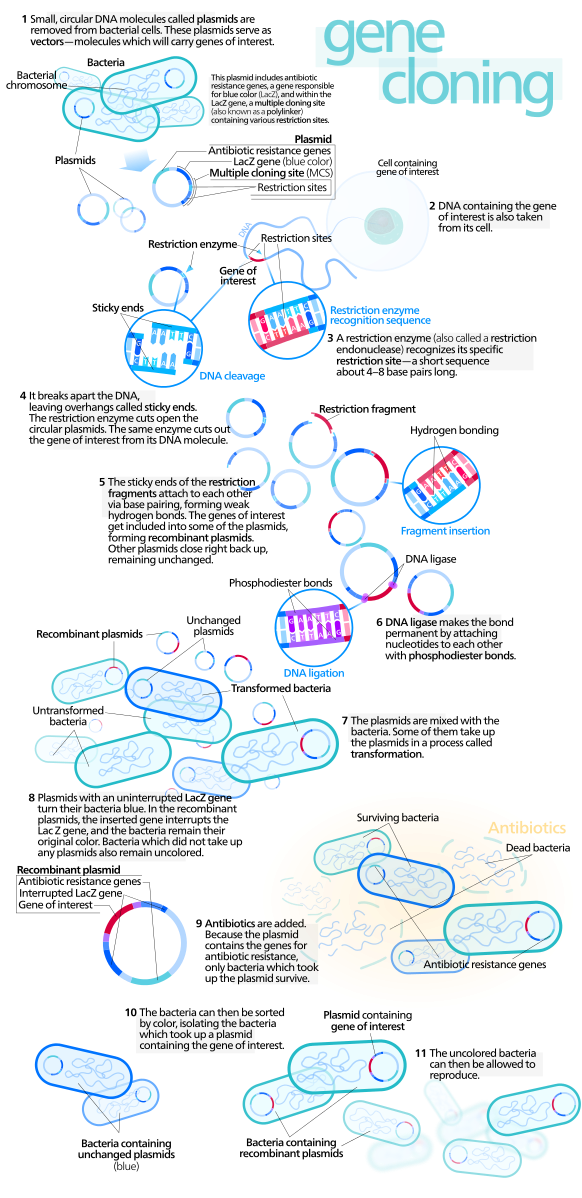Based on how it is named, the recombinant DNA is simply the recombination of DNA sequences from different organisms resulting in DNA sequences that wouldn't exist naturally. From my point of view, this is such a cool process, don't you think so?

Glowing mice created using the rDNA technology
To give a proper definition, rDNA molecules are molecules formed by the laboratory methods of genetic recombination such as molecular cloning.
This is achieved by simply putting together genetic materials from different sources and voila; a new DNA sequence is created.
Today, the rDNA technology is being used in different ways, one of which you've probably benefited from without even knowing. Before we talk about the different ways it is being applied, let's have an understanding of what the rDNA is all about.
Recombinant DNA
From the introduction, it has been established that rDNA molecules arise from the combining of DNA sequences from different organisms, due to this fact they can also be referred to as chimeric DNA. The only reason why rDNA are possible is because all organisms have the same chemical structure of DNA, the only difference is in the arrangement and composition of the nucleotide sequence. So we could have combinations of bacterial DNA and human DNA, mouse DNA and human DNA, it all depends on what exactly we're trying to achieve.
Genetic processes like crossing over during meiosis technically produces rDNA but this term is reserved DNA molecules created by combining DNA sequences gotten from different organisms.
To create a recombinant DNA a process known as Molecular Cloning is used. It involves the cutting and pasting of the desired fragments to be combined.
Molecular cloning
Cloning is simply a process in which genetically identical copies of organisms, cells or DNA fragments are created. When creating copies of an organism it is referred to as "organism cloning", when creating copies of cells it is referred to as "cell cloning" and when creating copies of DNA fragments it is referred to as "molecular cloning".
Molecular cloning is used to assemble rDNA molecules and direct their replication in a host organism.
In molecular cloning, DNA sequence from two organisms are generally used; the organism that will provide the DNA to be cloned and the organism that will act as the host for the replication of the rDNA.
First, the vector DNA is chosen; the vector DNA is one that has the ability to replicate foreign DNA inside a host cell (let's assume we choose a plasmid). The vector DNA is then prepared by digesting it with restriction endonuclease which produces fragments of the vector DNA. The desired DNA to be cloned is obtained from the organism and also split into fragments using the restriction endonuclease.
The fragments from the vector DNA and the DNA from the target organism is now combined using DNA ligase to create the recombinant DNA. This rDNA that has been formed is now introduced into the host organism ( in this case let's assume the host is E. Coli) for replication. In the subsequent population of the E. Coli, the rDNA will be replicated along with the host DNA. The new population containing the rDNA fragment can be referred to as GMO's ( genetically modified organisms).

an illustration of molecular cloning
Recombinant DNA technology Applications
This is interesting part, how it is being used, what it's being used for and how you've benefited from this technology without even knowing. There are various applications of this technology in many fields today including agriculture, medicine, e. t. c...
In Agriculture
You've most likely consumed rice, wheat, corn or any other agricultural produce that has been genetically modified and did not even realize, it's one of the many benefits of the rDNA technology.
In agriculture, rDNA technology is used to produce genetically modified crops ( GM crops). The first GM crop was the Flavr Savr tomato, produced in 1994, which had a longer shelf life and an enhanced flavor
The genome of the crop is manipulated to suit the desires of the farmer. It could be used to make the crop have a higher yield, longer shell life, insect resistance and a whole lot of other properties.
Herbicide resistance, for instance could be achieved by introducing a herbicide resistant bacterial Gene into the plant DNA, this helps to prevent the plant from being affected by the toxic product and leads to a higher yield.
In Medicine
rDNA technology plays an important role in the production of hormones, antibiotics and vaccines in the field of medicine.
production of antibiotics: Famous antibiotics penicillin and streptomycin are produced using penicillium and stretomyces fungi. Efficient strains of these fungi have been developed using rdna technology and this increases the yield of the antibiotics.
production of the insulin hormone: Insulin is a hormone needed by diabetic patients. The Human gene for insulin production could be incorporated into bacterial DNA and such genetically engineered bacteria are used for large scale production of insulin.
Gene therapy: The main aim is to provide a functional gene to cells lacking that function, with the aim of correcting a genetic disorder or acquired disease. It has had relatively limited success so far but it's still a very promising area for future studies in medicine.
In the production of Transgenic Organisms
Once the genome of an organism is manipulated it is referred to as a transgenic organism. They're mostly created for the purposes of laboratory research. Some examples include;
Golden rice which has been modified to beta-carotene, the precursor to vitamin A.
Blue roses that wouldn't occur naturally, it is achieved by modifying normally colored roses with pansy genes.
Production of Glowimg fishes have also been achieved using the rDNA technology.
The rDNA technology has proven to be an invaluable tool in the field of biotechnology and I believe there's still lots of room to explore it's many benefits and uses.
The end!!
Thanks for reading through ✌
Sources
DNA 's are now being combined? I hope it's not in humans too because i always know DNA to be a mans special identity.
It was a nice write up fola.
Well done.
Lol. It could be combined in humans too, it is used in gene therapy.
Thank you sir
Congratulations! This post has been upvoted from the communal account, @minnowsupport, by fololade from the Minnow Support Project. It's a witness project run by aggroed, ausbitbank, teamsteem, theprophet0, someguy123, neoxian, followbtcnews, and netuoso. The goal is to help Steemit grow by supporting Minnows. Please find us at the Peace, Abundance, and Liberty Network (PALnet) Discord Channel. It's a completely public and open space to all members of the Steemit community who voluntarily choose to be there.
If you would like to delegate to the Minnow Support Project you can do so by clicking on the following links: 50SP, 100SP, 250SP, 500SP, 1000SP, 5000SP.
Be sure to leave at least 50SP undelegated on your account.
WARNING - The message you received from @mubarr is a CONFIRMED SCAM!
DO NOT FOLLOW any instruction and DO NOT CLICK on any link in the comment!
For more information, read this post:
https://steemit.com/steemit/@arcange/phishing-site-reported-steemautobot-dot-ml
Please consider to upvote this warning if you find my work to protect you and the platform valuable. Your support is welcome!
Anytime i see DNA, i always think about my identity. I don't know if i can ever know enough of it though.
Nice article ma'am
Tgats
Congratulations @fololade! You have completed some achievement on Steemit and have been rewarded with new badge(s) :
Click on any badge to view your own Board of Honor on SteemitBoard.
To support your work, I also upvoted your post!
For more information about SteemitBoard, click here
If you no longer want to receive notifications, reply to this comment with the word
STOPDo not miss the last announcement from @steemitboard!